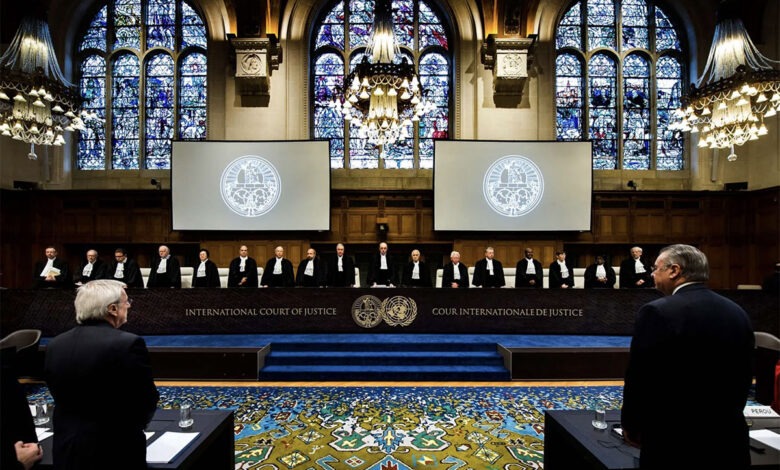Are Advisory Opinions a New Way to Resolve Disputes?
GCC and Arab States should Rely on Advisory Opinions to Resolve Disputes with Third Parties, Especially in Issues Related to Maritime Boundaries and Sovereignty

By Tareq Yousef AlShumaimry
Recently, there has been an increase in requests for advisory opinions from the International Court of Justice (ICJ) that relate to vital interests that directly affect the independence of States. Although advisory opinions are not binding and do not require the consent of the States concerned, advisory procedures have been increasingly and strategically used by States and international organizations as procedures to resolve specific legal disputes.
Procedures to request an advisory opinion constitute a “soft” litigation strategy and a particularly useful tool for small States or non-governmental entities, as they have the potential to balance the inherent power disparities in the international negotiation process by adding the authoritative voice of the ICJ to their disputed position.
Since its establishment in April 1946 the ICJ has addressed some of the most controversial issues in international affairs, including the independence of Kosovo and the use of nuclear weapons.
It also addressed issues that directly affect the vital interests of the State, such as the legality of the Israeli wall in the West Bank and, more recently, the end of Israel’s illegal occupation (recognition) of the Palestinian territories (the 1967 borders) as soon as possible.
Only two matters are pending before the ICJ – one relating to the obligations of the State in relation to climate change and the other relating to the International Labour Organization on the right to strike.
The ICJ accepts requests for advisory opinions from the UN General Assembly, the UN Security Council, specific international organizations, and authorized UN bodies.
Although an ICJ advisory opinion is not formally binding on States, in advisory opinions the ICJ exercises its authority to determine the precise scope of the rights and obligations of States or organizations and to declare what international law requires the State or organization to do or refrain from doing.
The pursuit of a formal ruling of law by an international court is rarely an end in itself, but rather a step in a broader political process, and the ICJ can therefore play a crucial role in international negotiations.
Advisory opinions can also play an increasingly important role in resolving disputes and can be used as a convenient litigation strategy. One could also argue that resorting to advisory procedures involves less risk of political costs, as there are no winners or losers in an advisory opinion.
Advisory procedures are fairly easy to access, as the main requirement is to lobby the UN General Assembly and obtain a majority vote, and then refer it to the ICJ. Advisory opinions are issued within a year, usually after the request of the UN General Assembly.
The GCC countries have not used the advisory opinion route in settling disputes. That it is a very feasible option is also evident from the fact that the ICJ itself cites its previous advisory opinions in its judgments and previous opinions, indicating that advisory opinions are considered valid precedent.
Moreover, the advisory opinion procedure also involves less financial costs compared to the procedures related to a dispute by filing a case before the International Court of Justice and it also appears that topics such as borders between states, controversial procedures and advisory procedures that are not clear in theory or practice can be used as a persuasive procedure in an attempt to resolve disputes between states if they cannot be resolved through political means.
The question naturally arises as to why states resort to requesting an advisory opinion instead of the controversial procedures of filing a case before international courts such as the International Court of Justice or the Permanent Court of Arbitration.
In some cases, an advisory opinion is the only available means of giving legal status to issues of international affairs in a world where not all states have agreed or joined the authority of international courts to determine their rights and obligations under international law.
Moreover, requesting an advisory opinion from the International Court of Justice may be the only mechanism available for settling disputes between recognized states and separatist groups within those states.
An advisory opinion is an attractive option when the state or non-state entity requesting the opinion has high moral standing and distinguished diplomatic and political relations and is likely to win acceptance of the request and obtain an advisory opinion in its favor.
For example, in the Kosovo Advisory Opinion, the dispute between Serbia and Kosovo was Serbia’s sole sponsor of the UN General Assembly resolution and believed it would win. However, the ICJ concluded in its advisory opinion that the adoption of the Declaration of Independence did not violate any applicable rule of international law.
A request for an advisory opinion may level the playing field and avoid the imbalance of power that pervades international negotiations to some extent in international judicial proceedings. All states and non-state entities are formally equal parties with respect to their legal standing and ability to make claims.
The ICJ responds to all legal claims in a coherent legal manner regardless of whether the claim is brought by a non-state entity, a powerful state, or a small state.
Vanuatu, an archipelago in the South Pacific and one of the countries most affected by climate change, has led the application, which is still pending before the International Court of Justice.
International request for an advisory opinion on States’ obligations related to climate change. The request includes a specific question regarding the legal consequences of these obligations in relation to States, especially Small Island Developing States, which, due to their geographical circumstances and level of development, are particularly vulnerable to the adverse effects of climate change.
One potential benefit of an advisory opinion on climate change is that it will help strengthen “States’ arguments in international climate change negotiations or undermine the arguments of other States.” Kuwait was also a party to this request, as were other GCC States.
Other reasons for seeking an advisory opinion include:
- The legal position of an advisory opinion constitutes strong support for the legitimate rights claimed.
- The advisory opinion identifies contradictory texts and illegal actions taken by one party against the other.
- The advisory opinion sometimes addresses whether compensation is due to the other party, which would be the beginning of a claim for compensation.
- In dealing with the issue of requesting an advisory opinion, the rest of the countries may have to point out and remind of the illegality of dealing with the usurping party.
- The advisory opinion reinforces the legal principles that help in the future negotiation process with the other party.
- The advisory opinion emphasizes the call to respect and implement this fatwa as an important step towards strengthening international legitimacy.
- The advisory opinion constitutes great moral and political pressure on the other party and the countries supporting it.
- The advisory opinion reinforces diplomatic and legal pressure on the other party.
- Although the advisory opinion is not binding, it is considered a step on a long road towards achieving justice for legitimate and disputed claims.
- Although the advisory opinion is not binding, it has legal weight and moral authority and is often a tool for preventive diplomacy.
- The advisory opinion helps clarify and develop international law, promote peaceful relations between countries, and maintain international peace.
- The advisory opinion represents a rejection of any claims that are not based on international law and are based only on the domestic law of the country itself.
- The advisory opinion achieves regional stability and the security of neighboring countries.
- The advisory opinion always refers in its details to international treaties, customs and laws that are difficult for the international community to ignore.
- The advisory opinion refers in some of its context to cases of failure to resolve, whether politically or diplomatically, and international law and its organizations always have a role in confronting and achieving the claims of one party against the other.
However, procedures and advisory opinion may not be the most effective way to resolve the dispute because of its non-binding nature.
However, resolving the dispute finally is not the only thing that states may think about when they choose to initiate dispute proceedings before international courts against another state. The advisory opinion issued by the International Court of Justice may be particularly effective when the motive behind its request is to publicize the matter and gain the support of world public opinion and diplomatic momentum.
Historically, even in the limited number of cases where adversarial procedures are available, states have been reluctant to avail themselves of them. Bringing a dispute against a third party or state is risky and time-consuming, and litigation can also be seen as an unfriendly act on the part of the respondent state and may affect its relationship with the state filing the claim.
The vast majority of requests for advisory opinions are made by the UN General Assembly through a resolution requiring a simple majority of states, so states do not stand alone but rather as a majority bloc against the “respondent” state, if any, and this can mitigate the adversarial nature inherent in contentious litigation.
From 1948 to 2024, the International Court of Justice has issued only 28 advisory opinions. Of the 28 advisory opinions published by the International Court of Justice, 20 of them relate to procedural and/or administrative issues of UN organs, such as the powers of the UN General Assembly to admit a State to the UN and to compensate for damages suffered in the service of the UN, the effects of compensation decisions issued by the UN Administrative Tribunal, requests for review of recent court decisions, and the interpretation of agreements concluded between UN organizations and States.
The subject matter of some of these opinions may have been of particular importance to some States, such as the interpretation of treaties between international organizations and host States. However, none of these cases affected the vital interests of the State and had a serious impact on international affairs.
During its first 40 years of operation, the ICJ issued only three advisory opinions (two requests to the UN General Assembly and one to the UN Security Council) directly relating to vital state interests and politically controversial issues, including two opinions on the independence of Namibia from South Africa and one on the decolonization of Western Sahara. However, from the mid-1990s onwards there has been an increase in the number of such advisory opinions.
The ICJ has issued four advisory opinions on matters that fundamentally and directly affect a state’s vital interests and/or territorial sovereignty, and two equally important requests for advisory opinions are still pending, all of which were submitted to the UN General Assembly.
The advisory opinion given by the International Court of Justice (ICJ) last month (July 19, 2024) to oblige Israel to end its illegal occupation of the Palestinian territories (1967 borders) as soon as possible is a landmark ruling that should serve as an example for considering advisory opinions as an option to conflict resolution.

Tareq Yousef AlShumaimry, served as Chairman of the Finance Committee and Chairman of the General Budget Committee of the Permanent Court of Arbitration in The Hague (PCA) and an observer in the Administrative Council of the Court and the Consular at International Court of Justice (ICJ) and the Embassy of the State of Kuwait in the Netherlands during this period from 2013 to 2020.
Email: tareq@alshumaimry.com












